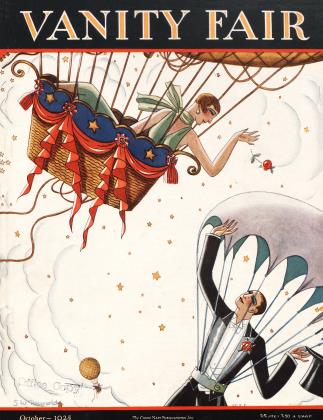Sign In to Your Account
Subscribers have complete access to the archive.
Sign In Not a Subscriber?Join NowRadio vs. Theatre
Is the "Show Business" Going Up in The Air Altogether?
SAMUEL HOFFENSTEIN
THE journals have been black, lately, with the dour prognostications and philippics of theatrical managers, directed against the imminent usurpation of the theatre by the brazen and aggressive radio. But the jeremiads of these entrepreneurs need not be taken seriously. Calamity begets attention; the buoyant spirit goes to the grave unsung and unhung. Any theatrical manager knows that there is infinitely more publicity in weeping and gnashing of teeth than in trumpets and shawms—about two columns per gnash as against a "stick" per shawm. Strumpets and sheiks are another matter; but that is a text for a gaudier pulpit than this.
What are they howling at? Let us consider the comparative merits of the radio and the playhouse. In articulation they are about equal. While the radio never rises to the heights of limpid speech, the pinnacles of pure el her, of Mr. Sam Bernard or Miss Marie Dressier, neither, on the other hand, does it ever achieve the preternatural vocal textures of Mrs. Fiske, or a bad case of unacclimated British adenoids, or Miss Marilynn Miller in song. In all other respects I find the radio the superior medium for the expression of the spoken drama.
The patron of the aerial theatre, again unhampered by the profane and practical eye, will find in this freedom a release also from the caprices and perversities of managers in the matter of casting and investiture. He can choose his own players and his own mise cn scene. Even if the names of the players are announced, he can, except where he knows the actor by sight—and in a generation of radiogoing, they will all be unknown— make his actors conform to his own conceptions of their appearance. His heroines may be as beautiful, his ingenues as inarticulate, his heroes as tailor-made, his villains as Satanic as he likes. This would be of inestimable advantage in the case of a familiar classic or an adaptation of a popular novel. A man is so much more sympathetic towards a Juliet when he's made her what she is today.
Should the play be a so-called triangle drama, the auditor may leisurely imagine the evidence from his easychair and form his own hypotenuse.
The radio also makes possible a specialization in amusement in thorough conformity with the usage of the age. It is the perfect complement of the movie. A man may, therefore, get an earful from one and an eyeful from the other without that trying division of sensory energy which the theatre demands, and which leads only to lowered efficiency in both departments.
The radio-fan would have at his command all the varied resources of the radio programme, which could easily be incorporated into the play proper. The atmospheric drama could, in fact, be a composite opus, containing not only a plot, but the informative and diverting elements of the whole elaborate radio repertoire, including sermons, bed-time stories, crop, weather and financial reports and music. The necessary dialogue could easily be written in. For instance:
SMITHERS: When you consider that Kansas has had a tornado every day last week, that the wheat crop failed in Dakota, and that Montana zinc is down to 22 ¾, you must admit that God moves in a mysterious way His wonders to perform.
BLITHERS: Yes, but we always have music to console us.
(Here we have a selection by the Calif ornia Jazzbo Five.)
SMITHERS: Well, I guess I'll turn in now.
BLITHERS: But before you go, have you heard the story of Br'er Rabbit?
(Here conies a bed-time story.)
Now actors in the theatre couldn't talk in that manner, or somebody would hit them. But the exasperated auditor, having no visible means of redress, would soon grow used to the irritation and gradually learn to like it. The public works like that.
The different items in the radio repertoire might also be used individually, to accentuate or relieve suspense. The catharsis might be indefinitely postponed, for instance, by a crashing interpolation of a scries of market reports, while the listener writhed on the floor in an agony of expectancy. A tension too long sustained might be exquisitely lightened by a mot by Mr. Al Jolson or a paragraph in the life of an East Side temptress by Miss Fannie Brice, or a hoarse report of a six-inch rainfall in Alabama by the catarrhal sylphs of the air.
The whole policy of the radio drama would be aimed at a blend of information and entertainment, in emulation, let us say, of Mr. Burton Holmes' travelogues, or the churchservices of the more radical metropolitan preachers. Let us select a theme. Blonde Esquimaux, for instance, are both fun and fact. Very good. An Arctic explorer, who has encountered these frozen anomalies, returns to his home in Cedar Rapids, Iowa. It is summer, so he tells his tale in the yard. Hidden behind the woodshed arc two fascinated listeners in the shape of a brace of wild and untrammelled small boys, who decide to go North and see for themselves if the eminent explorer is not "razzing the hicks." This is the end of act one.
Acts two and three would consist of the adventures, explorations and discoveries of the two urchins, narrated by themselves, with a liberal use of an all-male and deep-chested strophe and antistrophe to introduce Esquimaux folk-songs, report barometric pressure, describe the scenery, and make themselves useful generally.
This is, of course, a rough—a very rough—scenario. But I am convinced that an authentic play-doctor like Max Marcin or Willard Mack could work wonders with it.
 View Full Issue
View Full Issue












Subscribers have complete access to the archive.
Sign In Not a Subscriber?Join Now